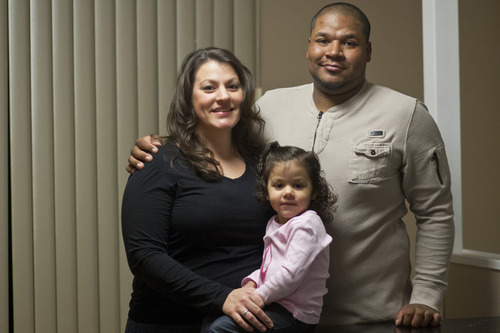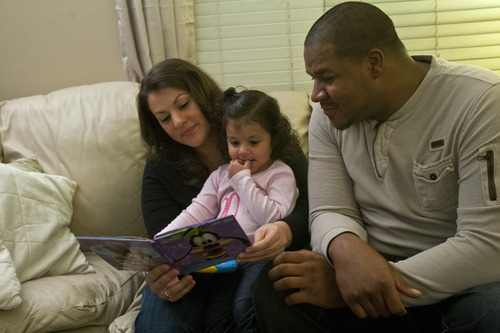This is an archived article that was published on sltrib.com in 2013, and information in the article may be outdated. It is provided only for personal research purposes and may not be reprinted.
An attorney for an unmarried father asked the Utah Supreme Court on Monday to find unconstitutional a provision in the state's adoption law that requires unwed biological fathers to file a sworn affidavit in addition to initiating a court paternity action and registering a paternity notice with the state.
Scott B. Wiser, attorney for William E. Bolden, said the affidavit is duplicative, redundant and unnecessary, and discriminates against unmarried fathers since unmarried mothers are not required to provide similar assurances about how they will care for and support a child.
But Larry Jenkins, an attorney representing the child's adoptive parents, said a birth mother's connection to her child is clear cut and the state has a legitimate interest in requiring unwed fathers to not only declare paternity but provide a sworn statement as to how they will fully meet parental responsibilities.
Bolden, who was then represented by a different attorney, filed a notice of paternity with the Utah Department of Health and a court paternity petition in mid-March 2011, about two weeks before his ex-girlfriend was expected to give birth to his son. But apparently his attorney failed to advise him of the need to also file the sworn affidavit.
"I was excited to have a son and was looking forward to it," said Bolden, a former semi-pro football player. Bolden said he made clear to the birth mother and to LDS Family Services, which handled the placement, before and at the time of the baby's birth that he opposed adoption.
The baby was born March 26, 2011. Bolden said the birth mother allowed him to visit his son before she was released from the hospital.
But she placed the infant for adoption three days later, after learning Bolden had not signed his paternity petition or filed a sworn affidavit, according to a court document.
Bolden subsequently sought to intervene in the adoption proceeding. Last summer, a 4th District Court judge ruled that, while Bolden had filed a notice and petition, he had not fully complied with Utah's adoption statute because he had not also filed a sworn affidavit detailing his support and child care plans, and thus failed to protect his rights. Bolden appealed that decision.
In a court document, Wiser said the "ultimate question" in the case is "why does the law presume that unwed fathers who have formally identified themselves before their child's birth are unwilling to assume parental responsibilities, while presuming that all unmarried mothers will fulfill theirs?"
"To presume that a parent will be more or less committed than another parent solely on the basis of gender is irrational under any standard of review," Wiser said. "A mother is not required to provide a sworn affidavit showing she is capable of assuming legal custody of a child or to disclose what her childcare plans would be in order to assure the state and would-be adoptive parents that she has 'at least thought through what [s]he would need to do to fulfill [her] parental responsibilities.' "
"That is the distinction that renders this requirement constitutional on its face," Wiser said. "The bottom line is that there needs to be a limiting principle to the scope of the Legislature's authority to regulate the conditions necessary for an unwed father to perfect his rights."
The justices focused on the rational basis for requiring unwed fathers to submit a sworn affidavit, noting as Justice Thomas Lee put it, that the information it contains would be "terribly useful to a mother deciding whether to put a child up for adoption" to have a biological father affirm his parental interest and commitment to a child's care.
"In any adoption case, the mother is voluntarily giving up [those] rights," Lee said.
Jenkins told the justices an unwed father has no fundamental, legal rights unless he complies fully with the law.
In a court document, he noted that it is "commonplace" for unwed mothers to be lulled into parenting a child based on false promises made by the father.
"If a man is not willing to legally commit to the mother and her future children by marrying her prior to the child's conception, it is not unduly harsh to require him to file a sworn affidavit making a legally binding commitment to his parental responsibilities prior to her placing the child for adoption," he said.
"That didn't happen here," Jenkins said. "There are rational reasons, compelling reasons, why the Legislature would require an unmarried father to file an affidavit like this. It's the only way to be sure someone is willing to step up."
"Simply filing a paternity petition does not show that an unwed father is willing to assume the parental role and fulfill corresponding responsibilities because a paternity petition is not required to include a request for custody, child support, or payment of pregnancy related expenses or childbirth expenses," Jenkins said in the court brief. "A paternity petition is also not required to set forth a plan for care of the child."
The four requirements in Utah adoption law
Utah's law has four steps that unwed biological fathers must follow before a birth mother consents to an adoption in order to intervene:
File a paternity petition in court.
File a sworn affidavit in court stating he is able and willing to have full custody of the child, detailing child care plans and agreeing to a court order of support and payment of pregnancy and birth-related expenses.
File a notice of commencement of a paternity action with the state vital statistics registrar.
Show, unless he was unaware of the pregnancy until birth, proof he offered to pay or paid pregnancy and birth-related expenses.







